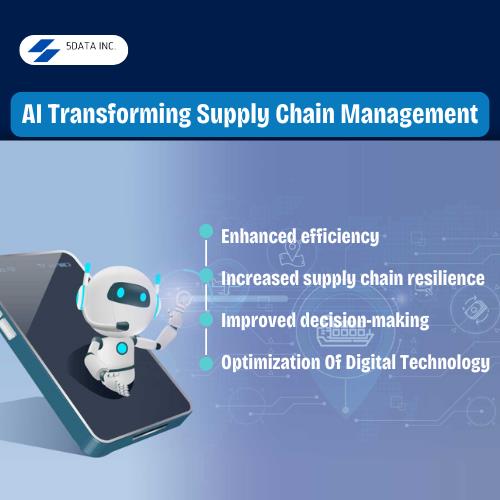As organizations increasingly adopt AI and digital transformation, they improve their ability to respond to disruptions, manage risks, optimize logistics, and ensure customer satisfaction. This article investigates how AI is influencing supply chains, enhancing efficiency, and revolutionizing key areas of supply chain management, including inventory, warehousing, and logistics.
Key Takeaways
- AI automates tasks, optimizes logistics, and improves inventory management, boosting overall supply chain efficiency.
- AI enhances supply chain resilience by predicting risks and enabling proactive responses to disruptions.
- AI delivers data-driven insights, improving resource allocation and decision-making for better customer satisfaction.
AI Transforming Supply Chain Management
The impact of AI is transforming global supply chains by optimizing demand forecasting and inventory management, reducing overstock and stockouts. This improves decision-making, enhances resilience, lowers costs, and boosts revenue as businesses adapt quickly to market demands.
Enhanced efficiency
- Automation of repetitive tasks: AI-powered technologies, including robotic process automation (RPA), can handle repetitive tasks, allowing human resources to prioritize more strategic initiatives.
- Optimized logistics: AI algorithms can analyze vast amounts of data to optimize transportation routes, reduce transportation costs, and improve delivery times.
- Improved inventory management: AI-driven systems can accurately predict demand patterns, optimize inventory levels, and minimize stockouts or excess inventory.
Increased supply chain resilience
- Risk mitigation: Identify potential risks and disruptions in the supply chain, support organizations in developing contingency plans, and mitigate the impact of artificial intelligence.
- Supply chain visibility: Live tracking into the supply chain allows organizations to track the movement of goods, identify potential bottlenecks, and respond to disruptions promptly.
- Predictive analytics: AI-powered can forecast disruptions, such as natural disasters or economic downturns, empowering organizations to take proactive measures.
Improved decision-making
- Data-driven insights: AI can process large datasets to deliver crucial insights for enhancing logistics efficiency, empowering organizations to make well-informed decisions.
- Optimized resource allocation: AI assists organizations in better resource allocation by pinpointing inefficiencies and streamlining processes.
- Enhanced customer satisfaction: Artificial intelligence can improve operational efficiency and responsiveness, contributing to higher customer happiness levels.
Optimization Of Digital Technology
The digitization process optimization of supply chains has been a transformative force, enabling organizations to improve efficiency, visibility, and responsiveness. Digital transformation has been instrumental in driving this change, providing the foundation for the impact of AI-powered solutions.
- Real-time visibility: Digital technologies, such as IoT sensors and RFID tags, provide instant visibility into the movement of goods throughout the supply chain. It enables organizations to track shipments, identify potential bottlenecks, and respond to digital transformation promptly.
- Data analytics: Digital platforms capture and analyze vast amounts of data, providing valuable insights into operational efficiency. This data can be used to identify inefficiencies, optimize processes, and make data-driven decisions.
- Cloud computing: Cloud-based platforms offer scalable and flexible solutions for managing supply chain data and applications. They enable organizations to access and analyze data from anywhere in the world, improving collaboration and decision-making.
Choosing an experienced Application development service provider ensures your business gets custom software solutions designed for economic growth, improved performance, and efficiency of business processes.
AI and Supply Chain Efficiency
AI is being utilized in multiple facets of operations management and supply chain research, driving significant improvements in efficiency and performance. Some key applications include:
- Demand forecasting: AI algorithms can analyze historical data and external environment factors to accurately predict demand patterns, empowering organizations to optimize inventory levels and production research planning.
- Transportation optimization: AI-based systems can improve transportation routes, reduce expenses, and accelerate delivery times by taking into account elements like traffic conditions and weather patterns.
- Warehouse management: The impact of AI is that it can automate warehouse operations, such as picking, packing, and inventory management, improving efficiency and reducing errors.
- Quality control: AI-powered vision systems can inspect products for defects, ensuring quality and reducing waste.
- Supplier management: AI can help organizations evaluate and select suppliers based on factors such as performance, reliability, and sustainability.
Partnering with the Best software application development service ensures high-quality, customized solutions that drive business innovation and success.

Challenges of AI in Supply Chain Management
While artificial intelligence offers significant benefits to business research, it also presents challenges and limitations that organizations need to address:
- Data quality: AI relies on high-quality data to deliver accurate results. Organizations must invest in data quality initiatives to ensure that their data is reliable and consistent.
- Implementation costs: Implementing AI solutions can be costly, requiring investments in hardware, software, and skilled personnel.
- Ethical considerations: AI’s impact on supply chains raises ethical concerns, such as privacy, bias, and accountability. Organizations need to tackle these issues to guarantee the responsible and ethical implementation of AI.
- Unforeseen events: AI might need help responding effectively to unexpected occurrences, like natural disasters or geopolitical crises. Organizations must develop continuous ongoing agency plans to address such disruptions.
Utilizing Top Mobile Application Testing Services guarantees that your app functions seamlessly and meets user expectations on various platforms.
Outlook for AI in Supply Chain Management
As the impact of AI technology continues to advance, its positive impact on operational management is expected to grow. Future developments in the digital supply chain may include:
- Increased automation: AI-powered robots and autonomous vehicles may become more prevalent in supply chain operations, further automating tasks and improving efficiency.
- Enhanced decision-making: AI may enable organizations to make more complex and sophisticated decisions, such as optimizing supply chain networks and managing risks.
- Integration with other technologies: AI can be fused with other innovative technologies like blockchain and the Internet of Things to develop more advanced and holistic supply chain solutions.
Conclusion
The Impact of AI is transforming supply chain management by driving digital transformation, boosting efficiency, and elevating overall performance. From advanced analytics for optimizing logistics and demand forecasting to operations research providing current visibility and automating repetitive tasks, AI-driven technologies are helping businesses stay competitive in a fast-changing and complex global supply chain environment. As AI continues to evolve, its impact on supply chains will only grow, leading to even greater levels of efficiency, resilience, and consumer satisfaction.
Frequently Asked Questions (FAQs)
1. How does digitization make the supply chain more efficient?
Digitization enhances supply chain optimization by enabling access to real-time data analysis, streamlining processes, and improving coordination among stakeholders.
2. How does digital technology and machine learning affect the supply chain?
Information technology and machine learning improve the supply chain by optimizing operations through predictive analytics, enhancing decision processes, and increasing responsiveness to demand changes.their IT setup.
3. How can AI mitigate risk management disruptions?
AI mitigates supply chain disruptions by analyzing data to predict risks, enabling proactive measures and adaptive strategies to maintain operational continuity.

Rasmita Patro
Author
